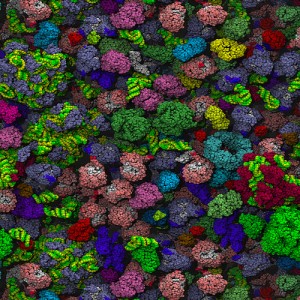Leaking Lipopolysaccharides from Gut Bacteria Linked to Heart Failure

Bacteria cytoplasm (Adrian Elcock)
By now you hopefully know that the gut can harbor good and bad bacteria. A healthy gut will harbor more good than bad. And a gut with a fair share of inflammation will likely be harboring more bad than good bacteria.
What you may not know is that like any living organism, bacteria excrete waste. For disease-causing bacteria, bacteria excrement is more technically referred to as endotoxins – because their waste matter presents our body with toxicity.
There are numerous types of endotoxins that pathogenic bacteria will produce. These include ammonia, hydrogen sulfide, indoles and many others – one of which we’ll discuss below. There are billions of bacteria within our gut – of many different species and strains. Just as these bacteria can be good or bad for our gut, their waste matter can be either healthy or unhealthy for our bodies.
Yes, our probiotic bacteria produce byproducts that can provide benefits to our body. Some of these byproducts are considered nutrients.
But the waste that pathogenic bacteria produce can become disease-causing for our bodies. Should populations of those bad bacteria build up in our gut, our bodies can become burdened with an overload of these endotoxins.
This problem can be further compounded with an intestinal condition medically called increased intestinal permeability – AKA leaky gut syndrome. This can enable a greater release of these toxins into the liver and bloodstream.
Let’s take a serious look at one of these endotoxins, compounded with leaky gut syndrome.
In this article
Lipopolysaccharide endotoxins
One of the more dangerous endotoxins produced by pathogenic bacteria are called lipopolysaccharides. These are typically produced by gram-negative bacteria. These bacteria actually have lipopolysaccharides in their cell membranes, so they slough off these endotoxins readily.
But it isn’t just the cell membrane parts that are toxic to the body. Within the lipopolysaccharide core and fatty acid portions lie a variety of toxic chemicals.
For example, connected to the lipid portion of the lipopolysaccharide can be a host of unhealthy fatty acids and disaccharides that together produce toxicity because they oxidize quickly in the blood.
Even the basic bacteria lipopolysaccharides will typically trigger an intense immune response by the body. This is one of the main reasons for septic shock. A systemic (body-wide) infection of bacteria will be attacked by the immune system and the lipopolysaccharides from the broken down bacteria bodies will overload the system. This can produce significant fevers and even sometimes death.
Lipopolysaccharide endotoxins exert a tremendous inflammatory response in the body. They can damage the liver, blood vessels and various organs and tissues should they come into contact with these. They can, in essence, cause disease.
This became evident to researchers from New Zealand’s Massey University. In their 2015 review of recent research on lipopolysaccharides, they found that even low levels of circulating lipopolysaccharides were problematic. They found continuous lipopolysaccharide circulation – even at low levels – were linked to increased incidence of insulin resistance, type-2 diabetes, atherosclerosis and cardiovascular disease.
Leaky gut and lipopolysaccharides
Leaky gut syndrome – increased intestinal permeability – can function quite like having a systemic bacterial infection. Should pathogenic bacteria be infecting the intestines, the lipopolysaccharides they produce may be contained somewhat in the gut.
Should the intestines have leaky gut syndrome, those endotoxins can leak out into the bloodstream in much larger numbers, endangering organs and tissues: Not so differently than a systemic infection.
Lipopolysaccharides boost heart disease risk
Evidence for the role of lipopolysaccharides in fatal disease is increasing. A 2015 study from Germany’s University of Medicine Goettingen and the National Heart and Lung Institute at the UK’s Imperial College of London found lipopolysaccharides linked to chronic and fatal heart failure.
The researchers tested 122 patients who had suffered from heart failure. They had an average age of 67 years old. They also tested 27 people without heart disease as control subjects. During their 24-month follow-up period, 56 of the heart patients died.
To prove a connection between the lipopolysaccharides and the heart failure, the researchers tested the patients’ sensitivity to lipopolysaccharides by testing necrosis factor-α (TNF-alpha). TNF-alpha is an immune system cytokine that can become specifically sensitized to certain toxins: Such as lipopolysaccharides. A high-sensitivity to lipopolysaccharides for TNF-alpha means the patient had an immune response to lipopolysaccharides. This means that lipopolysaccharides were problematic.
The researchers found that lipopolysaccharides sensitivity was evident with a sensitivity of 49 percent and a specificity of more than 81 percent. Even after the researchers eliminated every other possible contributing factors, lipopolysaccharides still provided a significant independent predictor of death for the heart patients.
The researchers stated in their conclusion:
“Lipopolysaccharides responsiveness in patients with chronic heart failure is an independent predictor of death.”
Reducing lipopolysaccharide leakage
As this research continues, we will be finding many more diseases linked to lipopolysaccharides. Practically any inflammatory condition should theoretically be connected to these bacteria waste products.
A two-pronged problem deserves a multi-pronged approach: Resolving leaky gut syndrome along with increasing our colonies of healthy probiotic bacteria. This will help decrease the production of lipopolysaccharides and other endotoxins. It will also help keep them endotoxins of our bloodstream: Where they can cause our body some serious health problems.
REFERENCES:
Gnauck A, Lentle RG, Kruger MC. The characteristics and function of bacterial lipopolysaccharides and their endotoxic potential in humans. Int Rev Immunol. 2015 Nov 25:1-31.
Ebner N, Földes G, Schomburg L, Renko K, Springer J, Jankowska EA, Sharma R, Genth-Zotz S, Doehner W, Anker SD, von Haehling S. Lipopolysaccharide responsiveness and chronic heart failure Risk. J Mol Cell Cardiol. 2015 Oct;87:48-53. doi: 10.1016/j.yjmcc.2015.07.029.
Adams C. The Science of Leaky Gut Syndrome: Intestinal Permeability and Digestive Health. Logical Books, 2012















